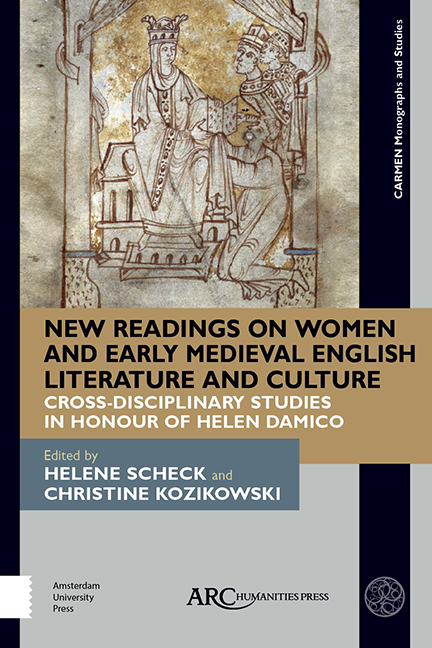 New Readings on Women and Early Medieval English Literature and Culture
New Readings on Women and Early Medieval English Literature and Culture Published online by Cambridge University Press: 20 November 2020
HELEN DAMICO HAS been rightly honoured for her status as foremother and pioneer in Anglo-Saxon studies. Her 1984 “Beowulf” 's Wealhtheow and the Valkyrie Tradition broke through the masculinist normativity of the field to claim a legitimate academic space for discussion of female characters and feminine agency in Old English literature. It is an honour to be included in this tribute volume; I offer here some history of Helen Damico's foremothers, the first women who taught Anglo-Saxon in United States colleges and who broke through different stereotypes to assert their rightful places in the academy.
In the summer of 1895, two Mount Holyoke College alumnae travelled to Oakland, California, to assume professorships in English at Mills College and Seminary. Mills was expanding its curriculum as part of its effort to drop the “seminary” part of its identity and become a full-fledged college. Ida Josephine Everett and Bertha Estelle Holbrook had been hired as part of that effort, and Everett was specifically appointed to teach Anglo-Saxon in the English language and literature curriculum. The inclusion of Anglo-Saxon in a women's college curriculum served throughout the late nineteenth and early twentieth centuries as an indicator of academic respectability in the United States. Mills was one of many institutions that offered Anglo-Saxon to establish its identity as a legitimate college rather than a finishing school, an academy, or a vocational school (all of which could use the term “college” in the days before accreditation and external academic oversight).
As undergraduate women learned Anglo-Saxon, some of them pursued graduate study and then became English and Anglo-Saxon professors themselves. Everett's and Holbrook's transcontinental journey is thus emblematic of the way that expertise in Anglo-Saxon created unprecedented opportunities for women serving in the first generations of female faculty and administrators at United States colleges and universities. The history of Anglo-Saxon in nineteenth-century women's colleges is a history of academic legitimacy and professional opportunity for women. This trend holds true not just in the elite Seven Sisters colleges of the northeast, the more usual focus of a women's higher educational history project, but also in a myriad of institutions with a variety of student populations, missions, and geographical locations (see Figure 14.1).
To save this book to your Kindle, first ensure no-reply@cambridge.org is added to your Approved Personal Document E-mail List under your Personal Document Settings on the Manage Your Content and Devices page of your Amazon account. Then enter the ‘name’ part of your Kindle email address below. Find out more about saving to your Kindle.
Note you can select to save to either the @free.kindle.com or @kindle.com variations. ‘@free.kindle.com’ emails are free but can only be saved to your device when it is connected to wi-fi. ‘@kindle.com’ emails can be delivered even when you are not connected to wi-fi, but note that service fees apply.
Find out more about the Kindle Personal Document Service.
To save content items to your account, please confirm that you agree to abide by our usage policies. If this is the first time you use this feature, you will be asked to authorise Cambridge Core to connect with your account. Find out more about saving content to Dropbox.
To save content items to your account, please confirm that you agree to abide by our usage policies. If this is the first time you use this feature, you will be asked to authorise Cambridge Core to connect with your account. Find out more about saving content to Google Drive.